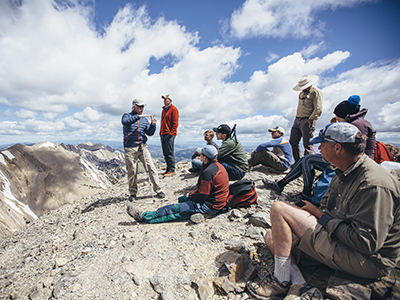About us
Graduate Studies in Science Education, supported by the Master of Science in Science Education (MSSE) program, promotes effective and innovative science teaching to a diverse community of science educators through the delivery of unique online and on-campus graduate courses designed specifically for science educators with a dual focus on content and pedagogy.
Values
Excellence – Strive to be an exceptional, adaptive, dynamic and rigorous program that results in high rates of successful completion and student satisfaction by utilizing best practices in teaching, learning, business, and customer service.
Service – Provide exemplary service that is professional, seamless, efficient, responsive, and prompt, that advocates for students, and that leads to open communication among students, staff, faculty, and administration.
Opportunity – Improve opportunities and access to education through innovative modes of program and course delivery as well as flexible options for research focus.
Diversity – Embrace diversity at all levels: student backgrounds and experiences, students’ settings and teaching assignments, faculty backgrounds, interdisciplinary curriculum options, individualized programs of study, and capstone opportunities.
Learning – Encourage, promote, and model life-long learning through comprehensive long-term action research, field and laboratory experiences, exposure to cutting edge research and researchers, and innovative instructional strategies.
Empowerment – Work to empower students, graduates, faculty, colleagues, and staff by providing, and promoting participation in, professional development and leadership opportunities such as presentations and/or representation at state and national conferences, assisting program faculty with research and instruction, mentoring/coaching new students and/or faculty, and serving on STEM related committees and boards at all levels.
Community – Promote the development of a community of life-long learners by creating opportunities for networking through campus-based field/laboratory courses and the annual symposium; by connecting alumni and providing for post-graduation involvement; by maintaining the program’s interdisciplinary focus; by continued communication with program stakeholders; and by celebrating the success of students, graduates, staff, and faculty.
History
The intercollege-interdisciplinary Master of Science in Science Education (MSSE) degree program was approved in May, 1996, by the Montana Board of Regents of Higher Education and is offered by Montana State University-Bozeman. This program was sponsored jointly by the Colleges of Agriculture; Education, Health and Human Development; Letters and Science; and the Graduate School. The Office of Intercollege Programs for Science Education coordinated the MSSE Program, and the Burns Telecommunications Center provided technical support. Today the program has expanded to include sponsorship with the College of Engineering and receives technology support from Academic Technology and Outreach (ATO).
Since MSSE's creation, MSU-Bozeman has gained valuable experience in offering on-line courses through the National Science Foundation-funded National Teachers Enhancement Network (NTEN) project. Since the early 1990's, those participating in MSU's NTEN project have offered many on-line science courses to teachers nationwide. In addition to increasing awareness, acceptance, and expertise among faculty and administrators, such experience with distance delivery has resulted in the development of an infrastructure for both faculty and student support that enables MSU to provide high quality learning experiences at a distance. In 2020, NTEN merged with MSSE, providing a robust, cohesive choice of online science content courses under the MSSE banner. In addition, certificate programs in the areas of Chemistry, Climate Science, Earth Science, Elementary School Science, Life Science, and Physics are available.
Instructors
The MSSE degree program was developed by Montana State University faculty members who are active in science, science education, and mathematics. The program is a unique, cooperative effort of several colleges and departments. Today, faculty members of the departments of Biology, Cell Biology and Neuroscience, Chemistry and Biochemistry, Computer Science, Earth Science, Education, Electrical Engineering, Land Resources and Environmental Science, Mathematics, Microbiology, Nutrition, Physics, and Plant Sciences teach courses. Instructors have doctorate and master's degrees in the subjects they teach.


